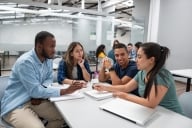You have /5 articles left.
Sign up for a free account or log in.
My spouse is the Director of Religious and Spiritual Life at the University of Rochester. She received her doctorate of divinity in interfaith studies from Princeton. Her dissertation, Many Faces of God, has become a curriculum for a program that she has offered to as varied of groups as local townspeople and parishioners in a small, western New York town (Penn Yan), seminary students at Rochester, Colgate, Crozier Divinity School and for the Rochester Episcopal Diocese. Invariably an initial concern is whether the study of other religions will result in conversions. In ten years of the program, that result has occurred only once, and with an individual who came in search of a faith, not from one faith or denomination particularly (so, in fact, it was not really a conversion, except by default of an estranged Christian family background.) What almost equally invariably occurs instead is that students report a deepening of their own, original faith by virtue of learning about and respecting the traditions and devotions of the faithful in other beliefs.
In the aftermath of the events in Boston, when once again the specter of twisting fear into caricature arises, and, in light of recent discussions about the impact of MOOCs on liberal education in which I have been involved most notably with last week's NITLE Summit and Symposium, I have begun to draw some procedural and substantive analogies from the Many Faces of God example. First, the fear that MOOCs (or some form of distance/distributed education, whether it is "massive," "open" or even a "course" per se) will be the end of residential liberal arts education as we know it. If residential liberal arts education is so impoverished and meaningless, then it deserves to fall away, but I don't believe for a second that is the case. What I have observed about technology in education generally is that far from "transforming" education, technology has for the most part been absorbed by the culture, traditions, credit hours, classrooms and course structure of the 19th century German disciplinary model upon which almost all of our colleges and universities found their curriculum and instruction. MOOCs (or any of its distance/distributed variations) with their "sage on the stage" approach hardly seem all that radically different to me. In fact, their their literal form, they seem to resemble more branding and marketing for particular institutions and faculty in a very traditional instructional format.
MOOCs (in their less literal form) have the potential to enhance that model. The more we can deploy the essential technology to connect faculty, students, classes and courses with people around the world the more enriched our learning will be. Learn a language from native speakers … and teach them English! There is no better way to learn about one's own language than both of those tasks. But don't leave the instruction there. How about their culture? Their politics? Manners, mores and, yes, religions? Could one imagine how much could be gained in the exchange? Couple those experiences with upper level semester or year abroad and one begins to image how exciting an undergraduate experience can be. Gone are the "sophomore slumps." Senior thesis might be to not merely reflect on the experience, but to apply to real life global challenges. How to envision a system of international jurisdiction and law? How to distribute medical and pharmaceuticals equitably among developed and developing countries? What does environmental sustainability look like from an international perspective (especially since nature does not care about national boundaries)? Share learning and research into the sciences, including computer science and engineering. For one example: how technically to make the Internet more secure? Why does the United States prize free speech so much and many other countries do not? Easy to pontificate from one's armchair, but go to another country and see what is stake there. In the end, donuts to dollars, a U.S. student will come back to this country with a deeper and greater respect for our law, political culture and traditions, but facile, judgmental thinking will be replaced by a deeper appreciation of what goes into concepts such as free speech as well as substantive knowledge of what "free speech" means.
Those thoughts skim the surface of what less literal "MOOCs" might bring to a liberal arts education. If MOOCs have the potential to be a real game changer, then they will change not liberal arts education so much as the curriculum. All the go right now is "competency" learning. I have nothing against it, although I am eager to see how it compares in the area of critical thinking skills to traditional liberal arts education done well along that vein. Because if I had to boil down to one factor the many factors that go into the value of a liberal arts education that is where I would put my dime. Is a person able to go out into the world and think enough for themselves to act autonomously as an individual citizen? To be sure, that does not mean that they have all the answers -- that would suggest the opposite model! Rather, do they know how to formulate probing, intelligent questions, and have ideas and thoughts about what resources to access and how to do so? Do they know how to engage their good intentions, desire to help build a better society, make the right kind of efforts, bring to that effort curiosity and creativity, gratitude and joy, challenging leadership skills that seek peaceful conclusions? If incorporating MOOCs into a liberal arts curriculum makes education relevant and inculcates these qualities, sign me up, right away. Accordingly, their potential will levitate liberal arts and make it all the more viable for a new day.






